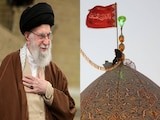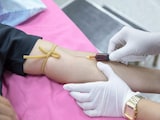A mother in the United Kingdom is warning other parents about the dangers of henna tattoos with "black ink" as she claims that it left her young daughter with burns and scars.
Taking to Facebook, Kirsty Newton revealed that her 7-year-old daughter Matilda got a tattoo of a butterfly at their hotel while on vacation in Turkey last month. However, instead of a pretty memory, the little girl was left hospitalised with an oozing chemical burn in the shape of a butterfly, the New York Post reported.
"Please be cautious when letting your children have Henna tattoos!! Matilda had a henna tattoo on holiday and it was absolutely fine, a week later she has had an allergic reaction," Ms Newton wrote on Facebook while sharing images of the henna tattoos.
"The doctor has since told us that sometimes extra pigment is used, especially abroad because the laws are not the same as the UK. Unfortunately because henna is designed to stay on the skin the allergen also stays which means she will continue to react to it. She has piriton and antibiotic cream and we are monitoring it for any changes in case of infection," she added.
According to the Post, the ordeal began when the family of four returned home to England from vacation. Soon after, Ms Newton noticed Matilda's tattoo growing red and itchy and eventually burning her skin. When the 7-year-old's burns began to crack and bleed, the mother rushed the girl to the hospital, where the doctors confirmed she was having an allergic reaction to black henna.
Also Read | Woman Claims She Found Correct Diagnosis For Son On ChatGPT After Visiting 17 Doctors
"The hospital said it was an allergic reaction to the black henna used, and she won't be able to use hair dye when she's older," Ms Newton said. "She had been sick on Thursday night [before we went to get her medication], which the doctors said could have been part of the reaction, and she had a rash on her tummy too," she added.
To help her skin, the girl was then given allergy pills, as well as topical steroids and antibiotic creams. The mother believes that p-phenylenediamine (PPD) - a chemical commonly found in dark hair dyes and a common ingredient added to henna - caused her daughter's reaction.
Now, Ms Newton hopes that the medicine given to Matilda will start working to heal the burn.
Notably, henna is a plant-based dye created from the henna tree. The leaves of the henna plant contain a natural colouring pigment that is used for temporary body art, colouring hair, dye skin, and fingernails as well as fabrics such as leather, wool, and silk.















